|
1
|
Vanderstichele A, Neven P and Vergote I:
Combined modality adjuvant therapy for high-risk endometrial
cancer. Lancet Oncol. 17:1029–1030. 2016. View Article : Google Scholar : PubMed/NCBI
|
|
2
|
Wirth T, Parker N and Ylä-Herttuala S:
History of gene therapy. Gene. 525:162–169. 2013. View Article : Google Scholar : PubMed/NCBI
|
|
3
|
Ezoe S, Matsumura I, Nakata S, Gale K,
Ishihara K, Minegishi N, Machii T, Kitamura T, Yamamoto M, Enver T
and Kanakura Y: GATA-2/estrogen receptor chimera regulates
cytokine-dependent growth of hematopoietic cells through
accumulation of p21(WAF1) and p27(Kip1) proteins. Blood.
100:3512–3520. 2002. View Article : Google Scholar : PubMed/NCBI
|
|
4
|
Bochis OV, Irimie A, Pichler M and
Berindan-Neagoe I: The role of Skp2 and its substrate CDKN1B (p27)
in colorectal cancer. J Gastrointestin Liver Dis. 24:225–234.
2015.PubMed/NCBI
|
|
5
|
Wang Z, Inuzuka H, Zhong J, Liu P, Sarkar
FH, Sun Y and Wei W: Identification of acetylationdependent
regulatory mechanisms that govern the oncogenic functions of Skp2.
Oncotarget. 3:1294–1300. 2012. View Article : Google Scholar : PubMed/NCBI
|
|
6
|
Xu SY, Wang F, Wei G, Wang B, Yang JY,
Huang YZ, Zhang L, Zheng F, Guo LY, Wang JN and Tang JM: S-phase
kinase-associated protein 2 knockdown blocks colorectal cancer
growth via regulation of both p27 and p16 expression. Cancer Gene
Ther. 20:690–694. 2013. View Article : Google Scholar : PubMed/NCBI
|
|
7
|
Chung YK, Chi-Hung Or R, Lu CH, Ouyang WT,
Yang SY and Chang CC: Sulforaphane down-regulates SKP2 to stabilize
p27(KIP1) for inducing antiproliferation in human colon
adenocarcinoma cells. J Biosci Bioeng. 119:35–42. 2015. View Article : Google Scholar : PubMed/NCBI
|
|
8
|
Masumoto K and Kitagawa M: E3 ubiquitin
ligases as molecular targets in human oral cancers. Curr Cancer
Drug Targets. 16:130–135. 2016. View Article : Google Scholar : PubMed/NCBI
|
|
9
|
Pratheeshkumar P, Siraj AK, Divya SP,
Parvathareddy SK, Begum R, Melosantos R, Al-Sobhi SS, Al-Dawish M,
Al-Dayel F and Al-Kuraya KS: Downregulation of SKP2 in papillary
thyroid cancer acts synergistically with TRAIL on inducing
apoptosis via ROS. J Clin Endocrinol Metab. 103:1530–1544. 2018.
View Article : Google Scholar : PubMed/NCBI
|
|
10
|
Zhang W, Cao L, Sun Z, Xu J, Tang L, Chen
W, Luo J, Yang F, Wang Y and Guan X: Skp2 is over-expressed in
breast cancer and promotes breast cancer cell proliferation. Cell
Cycle. 15:1344–1351. 2016. View Article : Google Scholar : PubMed/NCBI
|
|
11
|
Yamada S, Yanamoto S, Naruse T, Matsushita
Y, Takahashi H, Umeda M, Nemoto TK and Kurita H: Skp2 Regulates the
expression of MMP-2 and MMP-9, and enhances the invasion potential
of oral squamous cell carcinoma. Pathol Oncol Res. 22:625–632.
2016. View Article : Google Scholar : PubMed/NCBI
|
|
12
|
Zhang H, Kobayashi R, Galaktionov K and
Beach D: p19Skp1 and p45Skp2 are essential elements of the cyclin
A-CDK2 S phase kinase. Cell. 82:915–925. 1995. View Article : Google Scholar : PubMed/NCBI
|
|
13
|
Wirbelauer C, Sutterlüty H, Blondel M,
Gstaiger M, Peter M, Reymond F and Krek W: The F-box protein Skp2
is a ubiquitylation target of a Cul1-based core ubiquitin ligase
complex: Evidence for a role of Cul1 in the suppression of Skp2
expression in quiescent fibroblasts. EMBO J. 19:5362–5375. 2000.
View Article : Google Scholar : PubMed/NCBI
|
|
14
|
Tiscornia G, Singer O and Verma IM:
Production and purification of lentiviral vectors. Nat Protoc.
1:241–245. 2006. View Article : Google Scholar : PubMed/NCBI
|
|
15
|
Livak KJ and Schmittgen TD: Analysis of
relative gene expression data using real-time quantitative PCR and
the 2(-Delta Delta C(T)) method. Methods. 25:402–408. 2001.
View Article : Google Scholar : PubMed/NCBI
|
|
16
|
Wu H, Chen Y, Liang J, Shi B, Wu G, Zhang
Y, Wang D, Li R, Yi X, Zhang H, et al: Hypomethylation-linked
activation of PAX2 mediates tamoxifen-stimulated endometrial
carcinogenesis. Nature. 438:981–987. 2005. View Article : Google Scholar : PubMed/NCBI
|
|
17
|
Peth A, Uchiki T and Goldberg AL:
ATP-dependent steps in the binding of ubiquitin conjugates to the
26S proteasome that commit to degradation. Mol Cell. 40:671–681.
2010. View Article : Google Scholar : PubMed/NCBI
|
|
18
|
Bornstein G, Ganoth D and Hershko A:
Regulation of neddylation and deneddylation of cullin1 in SCFSkp2
ubiquitin ligase by F-box protein and substrate. Proc Natl Acad Sci
USA. 103:11515–11520. 2006. View Article : Google Scholar : PubMed/NCBI
|
|
19
|
Stacey DW: Cyclin D1 serves as a cell
cycle regulatory switch in actively proliferating cells. Curr Opin
Cell Biol. 15:158–163. 2003. View Article : Google Scholar : PubMed/NCBI
|
|
20
|
Xiao B, Spencer J, Clements A, Ali-Khan N,
Mittnacht S, Broceño C, Burghammer M, Perrakis A, Marmorstein R and
Gamblin SJ: Crystal structure of the retinoblastoma tumor
suppressor protein bound to E2F and the molecular basis of its
regulation. Proc Natl Acad Sci USA. 100:2363–2368. 2003. View Article : Google Scholar : PubMed/NCBI
|
|
21
|
Ru Y, Chen XJ, Zhao ZW, Zhang PF, Feng SH,
Gao Q, Gao SG and Feng XS: Cyclin D1 and p57 as biomarkers in
differentiation, metastasis and prognosis of gastric cardia
adenocarcinoma. Oncotarget. 8:73860–73870. 2017. View Article : Google Scholar : PubMed/NCBI
|
|
22
|
Georgiadou D, Sergentanis TN, Sakellariou
S, Filippakis GM, Zagouri F, Vlachodimitropoulos D, Psaltopoulou T,
Lazaris AC, Patsouris E and Zografos GC: Cyclin D1, p16(INK) (4A)
and p27(Kip1) in pancreatic adenocarcinoma: Assessing prognostic
implications through quantitative image analysis. APMIS.
122:1230–1239. 2014. View Article : Google Scholar : PubMed/NCBI
|
|
23
|
Yoo J, Jung JH, Lee MA, Seo KJ, Shim BY,
Kim SH, Cho DG, Ahn MI, Kim CH, Cho KD, et al: Immunohistochemical
analysis of non-small cell lung cancer: Correlation witll clinical
parameters and prognosis. J Korean Med Sci. 22:318–325. 2007.
View Article : Google Scholar : PubMed/NCBI
|
|
24
|
Fu ZJ, Ma ZY, Wang QR, Lei DP, Wang R, Liu
CX and Pan XL: Overexpression of CyclinD1 and underexpression of
p16 correlate with lymph node metastases in laryngeal squamous cell
carcinoma in Chinese patients. Clin Exp Metastasis. 25:887–892.
2008. View Article : Google Scholar : PubMed/NCBI
|
|
25
|
Fagan-Solis KD, Pentecost BT, Gozgit JM,
Bentley BA, Marconi SM, Otis CN, Anderton DL, Schneider SS and
Arcaro KF: SKP2 overexpression is associated with increased serine
10 phosphorylation of p27 (pSer10p27) in triple-negative breast
cancer. J Cell Physiol. 229:1160–1169. 2014. View Article : Google Scholar : PubMed/NCBI
|
|
26
|
Wang H, Chen H, Zhou H, Yu W and Lu Z:
Cyclin-dependent kinase inhibitor 3 promotes cancer cell
proliferation and tumorigenesis in nasopharyngeal carcinoma by
targeting p27. Oncol Res. 25:1431–1440. 2017. View Article : Google Scholar : PubMed/NCBI
|
|
27
|
Biçer A, Orlando S, Islam ABMMK,
Gallastegui E, Besson A, Aligué R, Bachs O and Pujol MJ: ChIP-Seq
analysis identifies p27(Kip1)-target genes involved in cell
adhesion and cell signalling in mouse embryonic fibroblasts. PLoS
One. 12:e01878912017. View Article : Google Scholar : PubMed/NCBI
|
|
28
|
Diersch S, Wenzel P, Szameitat M, Eser P,
Paul MC, Seidler B, Eser S, Messer M, Reichert M, Pagel P, et al:
Efemp1 and p27(Kip1) modulate responsiveness of pancreatic cancer
cells towards a dual PI3K/mTOR inhibitor in preclinical models.
Oncotarget. 4:277–288. 2013.PubMed/NCBI
|
|
29
|
Santala S, Talvensaari-Mattila A, Soini Y,
Kuvaja P and Santala M: Cyclins A, B, E and p27 in endometrial
endometrioid adenocarcinoma. Anticancer Res. 36:6467–6473. 2016.
View Article : Google Scholar : PubMed/NCBI
|
|
30
|
Zhu L, Chiao CY, Enzer KG, Stankiewicz AJ,
Faller DV and Dai Y: SIRT1 inactivation evokes antitumor activities
in NSCLC through the tumor suppressor p27. Mol Cancer Res.
13:41–49. 2015. View Article : Google Scholar : PubMed/NCBI
|
|
31
|
Lindberg D, Akerström G and Westin G:
Mutational analysis of p27 (CDKN1B) and p18 (CDKN2C) in sporadic
pancreatic endocrine tumors argues against tumor-suppressor
function. Neoplasia. 9:533–535. 2007. View Article : Google Scholar : PubMed/NCBI
|
|
32
|
Zhu CQ, Shih W, Ling CH and Tsao MS:
Immunohistochemical markers of prognosis in non-small cell lung
cancer: A review and proposal for a multiphase approach to marker
evaluation. J Clin Pathol. 59:790–800. 2006. View Article : Google Scholar : PubMed/NCBI
|
|
33
|
Jung D, Khurana A, Roy D, Kalogera E,
Bakkum-Gamez J, Chien J and Shridhar V: Quinacrine upregulates
p21/p27 independent of p53 through autophagy-mediated
downregulation of p62-Skp2 axis in ovarian cancer. Sci Rep.
8:24872018. View Article : Google Scholar : PubMed/NCBI
|
|
34
|
Wang ST, Ho HJ, Lin JT, Shieh JJ and Wu
CY: Simvastatin-induced cell cycle arrest through inhibition of
STAT3/SKP2 axis and activation of AMPK to promote p27 and p21
accumulation in hepatocellular carcinoma cells. Cell Death Dis.
8:e26262017. View Article : Google Scholar : PubMed/NCBI
|
|
35
|
Kim JY, Lim SJ, Kim HJ, Shin E, Park K and
Lee CM: Clinical significance of p27 and Skp2 protein expression in
uterine cervical neoplasm. Int J Gynecol Pathol. 26:242–247. 2007.
View Article : Google Scholar : PubMed/NCBI
|
|
36
|
Handra-Luca A, Ruhin B, Lesty C and Fouret
P: P27, SKP2, and extra-cellular signal-related kinase signalling
in human salivary gland mucoepidermoid carcinoma. Oral Oncol.
42:1005–1010. 2006. View Article : Google Scholar : PubMed/NCBI
|
|
37
|
Guan G, Bakr MM, Firth N and Love RM:
Expression of cyclin D1 correlates with p27KIP1 and
regulates the degree of oral dysplasia and squamous cell carcinoma
differentiation. Oral Surg Oral Med Oral Pathol Oral Radiol.
126:174–183. 2018. View Article : Google Scholar : PubMed/NCBI
|
|
38
|
Lee KH, Lee HE, Cho SJ, Cho YJ, Lee HS,
Kim JH, Nam SY, Chang MS, Kim WH and Lee BL: Immunohistochemical
analysis of cell cycle-related molecules in gastric carcinoma:
Prognostic significance, correlation with clinicopathological
parameters, proliferation and apoptosis. Pathobiology. 75:364–372.
2008. View Article : Google Scholar : PubMed/NCBI
|
|
39
|
Pesutić-Pisac V, Punda A, Gluncić I,
Bedeković V, Pranić-Kragić A and Kunac N: Cyclin D1 and p27
expression as prognostic factor in papillary carcinoma of thyroid:
Association with clinicopathological parameters. Croat Med J.
49:643–649. 2008. View Article : Google Scholar : PubMed/NCBI
|
|
40
|
Jonason JH, Gavrilova N, Wu M, Zhang H and
Sun H: Regulation of SCF(SKP2) ubiquitin E3 ligase assembly and
p27(KIP1) proteolysis by the PTEN pathway and cyclin D1. Cell
Cycle. 6:951–961. 2007. View Article : Google Scholar : PubMed/NCBI
|
|
41
|
Li Z, Jiao X, Wang C, Ju X, Lu Y, Yuan L,
Lisanti MP, Katiyar S and Pestell RG: Cyclin D1 induction of
cellular migration requires p27(KIP1). Cancer Res. 66:9986–9994.
2006. View Article : Google Scholar : PubMed/NCBI
|
|
42
|
Tsvetkov LM, Yeh KH, Lee SJ, Sun H and
Zhang H: p27(Kip1) ubiquitination and degradation is regulated by
the SCF(Skp2) complex through phosphorylated Thr187 in p27. Curr
Biol. 9:661–664. 1999. View Article : Google Scholar : PubMed/NCBI
|
|
43
|
Carrano AC, Eytan E, Hershko A and Pagano
M: SKP2 is required for ubiquitin-mediated degradation of the CDK
inhibitor p27. Nat Cell Biol. 1:193–199. 1999. View Article : Google Scholar : PubMed/NCBI
|
|
44
|
Nakayama K, Nagahama H, Minamishima YA,
Miyake S, Ishida N, Hatakeyama S, Kitagawa M, Iemura S, Natsume T
and Nakayama KI: Skp2-mediated degradation of p27 regulates
progression into mitosis. Dev Cell. 6:661–672. 2004. View Article : Google Scholar : PubMed/NCBI
|
|
45
|
Pagano M: Control of DNA synthesis and
mitosis by the Skp2-p27-Cdk1/2 axis. Mol Cell. 14:414–416. 2004.
View Article : Google Scholar : PubMed/NCBI
|
|
46
|
Wu L, Grigoryan AV, Li Y, Hao B, Pagano M
and Cardozo TJ: Specific small molecule inhibitors of Skp2-mediated
p27 degradation. Chem Biol. 19:1515–1524. 2012. View Article : Google Scholar : PubMed/NCBI
|
|
47
|
Pavlides SC, Huang KT, Reid DA, Wu L,
Blank SV, Mittal K, Guo L, Rothenberg E, Rueda B, Cardozo T and
Gold LI: Inhibitors of SCF-Skp2/Cks1 E3 ligase block
estrogeninduced growth stimulation and degradation of nuclear
p27kip1: Therapeutic potential for endometrial cancer.
Endocrinology. 154:4030–4545. 2013. View Article : Google Scholar : PubMed/NCBI
|



















